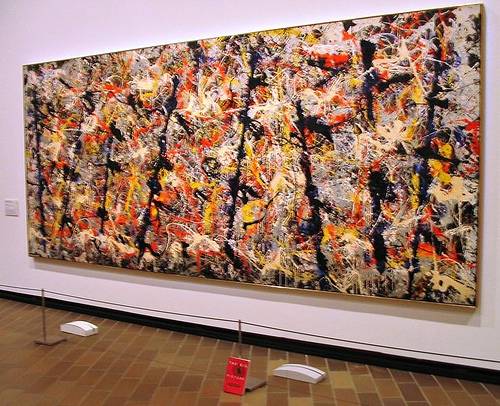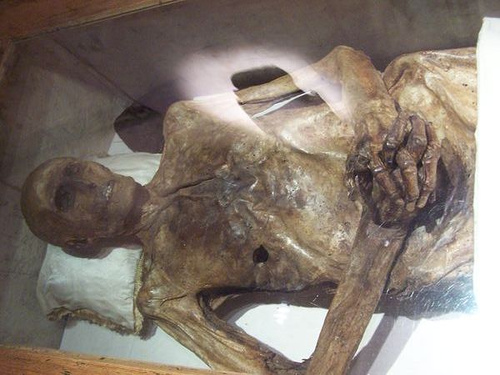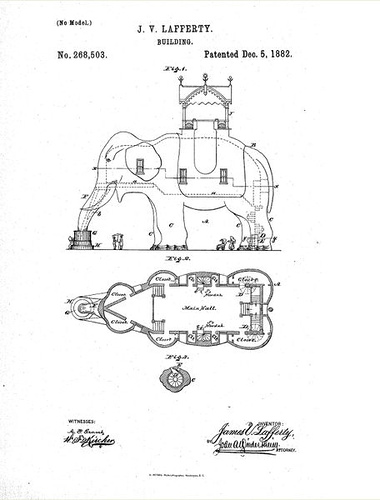No science fiction film has ever been named best picture.
White Meat
In his 1647 Del Luce Animalium, Danish physician Thomas Bartholin noted a great lost opportunity for animal husbandry.
In France’s Montpellier market, he wrote, a chicken had appeared whose feathers glowed. Killed for closer study, the cock “shone on all parts of its body with a remarkably strong light.”
At the same time, he said, an Italian hen from Montebello “shone like a ball of white fire.”
It was a pity, Bartholin noted, that the two birds couldn’t be bred together, “for we might then have obtained a breed of incandescent fowls.” And saved money on candles.
Showcase Dropcloth

Artist Jackson Pollock put his canvas on the floor and poured paint on it from a height.
Critics called him “Jack the Dripper.”
Command Performance
The Bavarian village of Oberammergau has a special deal with God. While the bubonic plague was ravaging Europe, the town’s citizens vowed that if they were spared they would perform a play every 10 years depicting the life and death of Jesus.
God, apparently, accepted. The death rate among adults rose from 1 in October 1632 to 20 in March 1633, but then it dropped again to 1 in July 1633.
True to their word, the villagers staged a play in 1634, and they’ve done so every 10 years ever since.
“The Marriage Was Illegible”
Excerpts from student exams in the 19th century:
- “He enjoys riding on a philosopher.”
- “The leopard is watching his sheep.”
- “They had a strawberry vestibule.”
- “The men employed by the Gas Company go around and speculate the meter.”
- “Her hat is contiguous because she wears it on one side.”
- “He preached to an egregious congregation.”
- “The captain eliminated a bullet through the man’s heart.”
- “You should take caution and be precarious.”
- “We should endeavor to avoid extremes–like those of wasps and bees.”
- “There are a good many donkeys in theological gardens.”
- “A verb is something to eat.”
- “A circle is a round straight line with a hole in the middle.”
- “Things which are equal to each other are equal to anything else.”
- “North America is separated by Spain.”
- “The principal products of the U.S. is earthquakes and volcanoes.”
- “The Rocky Mountains are on the western side of Philadelphia.”
- “One of the leading industries of the United States is mollasses, book-covers, numbers, gas, teaching, lumber, manufacturers, paper-making, publishers, coal.”
- “Russia is very cold and tyrannical.”
- “Hindoostan flows through the Ganges and empties into the Mediterranean Sea.”
- “Ireland is called the Emigrant Isle because it is so beautiful and green.”
— From Mark Twain, “English as She Is Taught: Being Genuine Answers to Examination Questions in Our Public Schools,” 1887
Christian von Kahlbutz

Christian Friedrich von Kahlbutz is looking remarkably fit for his age. The Prussian knight died in 1702 and his body hasn’t decayed.
No one knows why. He wasn’t embalmed. A legend says it’s God’s punishment for an oath he broke while living. Scientists think he lost a lot of blood before dying and that the local soil lacked materials that would promote decay. But that doesn’t explain why other bodies nearby did rot.
When in Rome …
A Latin palindrome:
IN GIRUM IMUS NOCTE ET CONSUMIMUR IGNI.
(“We enter the circle at night and are consumed by fire.”)
It was said to describe the behavior of moths.
Status Symbol
The first Humvee manufactured for civilian use was bought by Arnold Schwarzenegger.
A Hotel That Never Forgets

The largest elephant in the world is made of wood and tin sheeting. “Lucy” was built south of Atlantic City in 1882 by James V. Lafferty, who hoped to attract tourists and sell real estate.
Lafferty saw big potential in “zoomorphic architecture,” apparently. He got an exclusive patent on animal-shaped buildings, and soon surpassed Lucy with an Elephantine Colossus at Coney Island. At 12 stories tall, it was twice Lucy’s size, with a cigar store in one leg, a dioramic display in another, hotel rooms in the body, and an observation area at the top, with panoramic views of the sea.
Sadly, the Elephantine Colossus was destroyed by fire in 1896, but Lucy herself still stands, and has served as a restaurant, a business office, a cottage, a hotel, and a tavern. Today she’s a national historic landmark.
Unquote
“There is nothing so absurd but some philosopher has said it.” — Cicero
